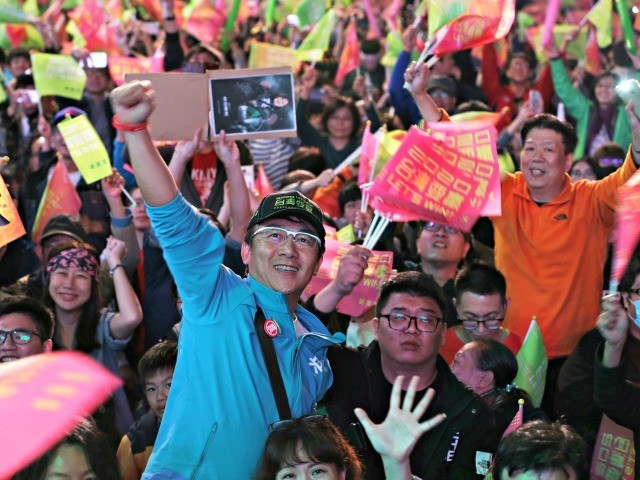WASHINGTON, DC — American and Taiwanese officials celebrated President Tsai Ing-wen’s reelection on Saturday, in what is widely considered a rebuke to China.
Tsai won in a landslide victory over pro-Beijing candidate Han Kuo-yu, the mayor of Kaohsiung, the second largest city in Taiwan.
“The people in Taiwan proved that democracy works,” said Ambassador Stanley Kao, Taiwan’s top representative in Washington, D.C., at an event marking the election.
James F. Moriarty, the top American diplomat in Taiwan, was also at the event to celebrate the occasion. “It’s a great morning for Taiwan and for all people who believe they should decide their own futures,” he said. “In 2020 we will work closely together to advance our shared interests and values.”
Randy Schriver, until recently the assistant secretary of defense for Indo-Pacific Security Affairs, echoed his remarks. “This is in fact a great day for all the people of Taiwan,” said Shriver, chairman and founder of Project 2049.
“Its democracy is such a key part of why Taiwan is internationally admired,” he added. “There will be many people in China wondering ‘why can’t we go to the polls.'”
Since Tsai’s election in 2016, China has ramped up diplomatic and military pressure on Taiwan in an effort to isolate the self-governing island. China considers Taiwan a breakaway province, while Taiwan maintains it is a separate nation and the only Chinese-speaking democracy.
The U.S. switched its diplomatic ties from Taiwan to China in 1979 but maintains robust informal diplomatic relations with Taiwan and a duty to help Taiwan defend itself against China. China’s current president has pledged to reunite the two by 2049, including by force.
Tsai’s party, the Democratic Progressive Party (DPP) favors the status quo between China and Taiwan, while Han’s party, the Kuomingtang (KMT), favors closer relations with Beijing.
Tsai’s victory had been far from certain. But after mass protests broke out last summer in Hong Kong against what protesters saw as Beijing’s increasing violations of Hong Kong’s autonomy under the “one country, two systems” policy, support for Tsai swelled.
Han “never recovered from the political impact of the protests in Hong Kong,” said Derek Mitchell, president of the National Democratic Institute, during a panel discussion at the event.
Noting Beijing’s efforts to spread disinformation ahead of the elections, the Center for Strategic and International Studies’ Bonnie Glaser said Beijing “has not succeeded in bullying and intimidating Taiwan.”
Jonathan Fritz, deputy assistant secretary of state for China, Mongolia, and Taiwan Coordination, said the U.S. would work to further strengthen the informal U.S.-Taiwanese relationship and “to counter the unilateral efforts to change the status quo.”
Walter Lohman, director of the Asian Studies Center at the Heritage Foundation, called for closer ties between the U.S. and Taiwan, including a free trade agreement. “The timing is right on the U.S. side,” he said.
In Taiwan, Tsai delivered a rousing victory speech that paid tribute to the “courage and persistence” of Taiwan.
“This evening belongs to all the people of Taiwan,” she said. “Together we have held on to this land of freedom. Together we have held on to this stronghold of democracy.”
“This is the prize of democracy, this is the weight of democracy, this is the taste of freedom,” she said.
In a reference to Beijing, she said that she believed the “other side of the Taiwan Strait has heard us,” and called upon its leadership for dialogue.
She called for all political parties in Taiwan to “unite and work together.”
“Once again, today we hold on to freedom and democracy, tomorrow let us work together to overcome all sorts of challenges thrown at us,” she said.
Russell Hsiao, executive director of Global Taiwan Institute, which co-hosted Saturday’s event, said, “This is indeed a remarkable demonstration of democracy in action.”
“Not all countries take the risk of letting their average citizens elect leaders,” the Brookings Institution’s Richard Bush said during a panel discussion at the event. “Taiwan has been willing to take that risk for over 20 years.”
Follow Breitbart News’s Kristina Wong on Twitter or on Facebook.

COMMENTS
Please let us know if you're having issues with commenting.